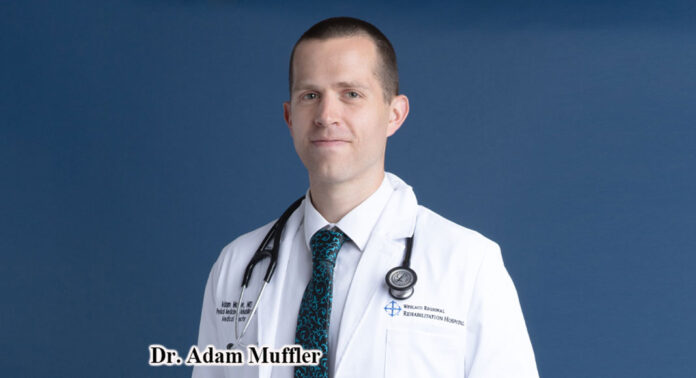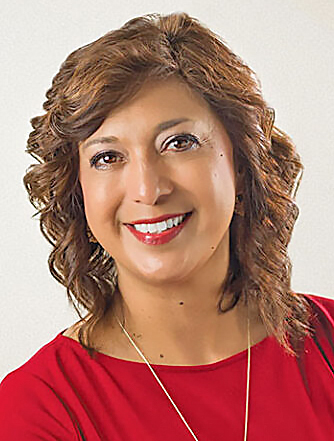Mega Doctor News
Adam Muffler, MD has been named Medical Director of Weslaco Regional Rehabilitation Hospital (WRRH), which provides specialized inpatient and outpatient physical rehabilitative services to over 600 patients a year from Mid-Valley and its surrounding areas.
Dr. Muffler earned his medical degree from the University of Texas Southwestern Medical Center in 2017 followed by a residency in physical medicine and rehabilitation at the University of Texas Southwestern Medical Center which he completed in 2021.
Dr. Muffler’s clinical interests include general medical rehabilitation (especially COVID-19), strokes, amputations, spasticity, and spinal cord injury. Other professional interests include patient education, transitions across various levels of care, providing cost-effective healthcare. “I’m thrilled to be able to provide care which serves some of the rehabilitation needs of the rapidly growing Rio Grande Valley community,” said Muffler regarding his new role.
Dr. Muffler grew up in Colorado. He is a father of four children who is heavily involved with their sports and extracurricular activities and can frequently be found with them at parks. He is an avid consumer of chocolate (particularly M&Ms), owns many more video games than he has time for, and continues to try to grow a variety of fruits and vegetables in his backyard. He is cognizant of the mind-body connection and stays active by running and resistance training.
Weslaco Regional Rehabilitation Hospital accredited by the Joint Commission, treats patients who are recovering from disabilities caused by injuries or illnesses, such as strokes, amputations, orthopedic, brain and spinal cord injuries. The hospital also treats individuals with chronic illnesses such as cerebral palsy, ALS (Lou Gehrig’s disease), multiple sclerosis, or Parkinson’s disease.
WRRH has also been in the Top 10 percent of inpatient rehabilitation facilities in the United States for four years by the Uniform Data System for Medical Rehabilitation (UDSMR), a non-profit corporation that was developed with support from the U.S. Department of Education, National Institute on Disability and Rehabilitation Research. The UDSMR maintains the world’s largest database of rehabilitation outcomes. The hospital’s care was cited as being as being patient-centered, effective, efficient, and timely.
“We strive to deliver this higher level of care as our standard,” says Corina Rodriguez, CEO of Weslaco Regional Rehabilitation Hospital. “We have graciously been recognized as a top performing facility, but we never take it for granted. Our staff is exceptionally passionate about helping patients reach their full potential through the care we provide. We work daily to ensure patients are reaching their highest levels of ability and independence.”
“If you take into account that a national study has previously shown that inpatient rehabilitation facilities provide better long-term results for patients, being ranked at the top of that group validates the quality of care we provide,” says Rodriguez, referencing a study commissioned by the ARA Research Institute that showed patients treated in inpatient facilities experienced improved quality of life as compared to skilled nursing facilities.
Weslaco Regional Rehabilitation Hospital has also earned The Joint Commission’s national disease-specific certification in stroke rehabilitation and is currently the only facility in the Rio Grande Valley to hold an amputee rehabilitation certification. This means the hospital is providing the highest level of stroke and amputee care available in the nation to its patients.
Both strokes and amputations are very prevalent in our community and can be debilitating for individuals and their families,” says Rodriguez, “We know it’s our responsibility to ensure our patients are provided the best chances of recovery. The review and certification provided by The Joint Commission lets us – and the community – know that we are setting a new standard of care for patients who have suffered a stroke or an amputation.
“To get the most successful results for our patients, we use best practices and follow evidence-based clinical practice guidelines,” says Muffler. “This helps us provide not only the physical, but the emotional healing our patients need.”
Muffler says by following best practices, the hospital can:
- Provide quicker patient recovery times
- Allow more patients to discharge home
- Help patients obtain more physical and cognitive independence
Muffler says that family involvement is also promoted in conjunction with the clinical practice guidelines. “Family involvement is key to a patients’ recovery process,” he says. “Engaged family members help increase the chance that patients will be discharged back home as quickly and safely as possible, as we’ve seen through our program.”
At the hospital, an interdisciplinary healthcare team works with patients and their family members to create individualized treatment plans so the patients can progress at their own ability levels. The rehabilitation team includes specially trained physicians, nurses, case managers, and occupational, speech, and physical therapists – among other medical professionals. Patients receive 24-rehabilitative nursing care and daily physician management.
All patients have access to private patient rooms and well-equipped therapy areas, including a 2,400-square-foot therapy gym, a daily living suite, and a transitional suite to allow patients to practice at-home activities while still under the supervision of a healthcare professional. In addition, the hospital offers home evaluations to identify any necessary modifications that may need to be made to a patient’s house before leaving the hospital to ensure a safer return home.
“To provide the highest level of rehabilitative care available in the United States to our own community is truly rewarding,” Rodriguez says. “This means our family, friends, and colleagues don’t need to leave the area to receive the best care available.”










